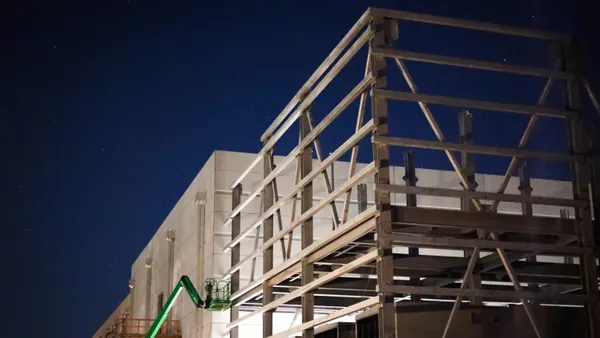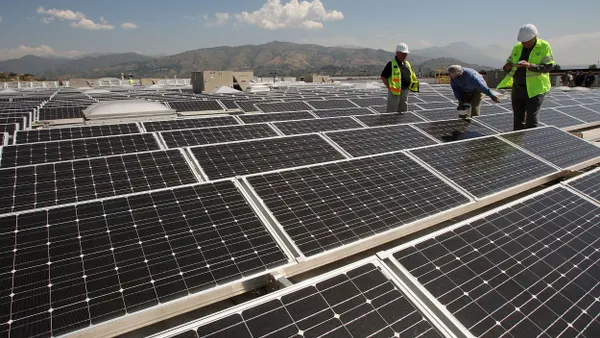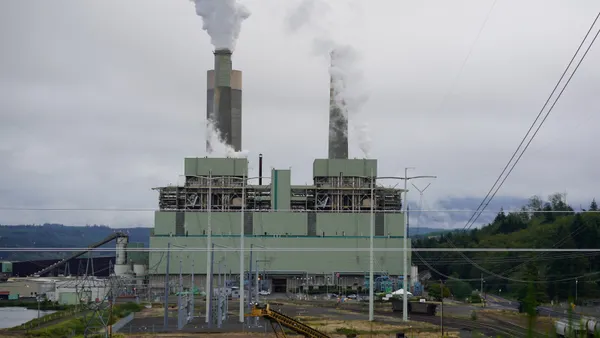Dive Brief:
- Federal Energy Regulatory Commission member Robert Powelson dismissed the notion that natural gas generators "didn't perform" during the Polar Vortex in a Monday speech, rejecting a main assumption behind Department of Energy's cost recovery rule for coal and nuclear plants.
- Powelson said it was a "mistruth" that gas plant issues were the chief driver of power outages during the Vortex, S&P Global reports, when sub-zero temperatures froze mechanical components at many power plants, leading to forced outages.
- Powelson's comments come less than two weeks after he pledged that FERC "will not destroy the marketplace" as it responds to the rulemaking proposal from the Department of Energy. Independent experts and former FERC regulators have warned that the DOE proposal, if enacted as written, could unravel wholesale power markets.
Dive Insight:
Secretary of Energy Rick Perry often mentions the threat of power sector emergencies like the Polar Vortex as justification for his department's proposal to provide cost recovery to power plants with 90 days of fuel supply onsite.
Last week, Perry repeatedly referenced the Vortex at a House committee meeting on the DOE proposal, telling lawmakers the cost of his plan should be "secondary" to keeping the lights on in emergencies.
"We’re probably going to have another one," Perry said of the Vortex. "And if we are, shouldn’t it be our responsibility to make sure that when your constituents turn the lights on that they’re not having to make the decision between staying warm and having light?"
Perry's line of reasoning rests on the assumption that generators with fuel onsite would perform better in extreme weather conditions than natural gas plants, which must draw fuel through pipelines. But multiple House members questioned that reasoning at the hearing, pointing out that onsite coal supplies froze in the Vortex and were recently inundated by flood waters after Hurricane Harvey.
Powelson added his voice to that chorus on Monday, telling an audience at the Association for Blacks in Energy policy summit that gas issues did not drive disruptions.
"There’s a dirty little secret going around that the gas guys didn't perform during the Jan. 6 and 7 timeline," he said. "I am here to tell you unequivocally that is not the case, and I can’t stand here and represent what we call a mistruth that the gas industry caused the interruptions of the Polar Vortex.”
Powelson also reportedly addressed reforms enacted by grid operator PJM since the extreme weather, saying that they had helped to "weed out some of these bad actors in the marketplace" and noting a new capacity performance construct put in place to ensure generators perform in peak demand periods.
Powelson, confirmed to FERC in August, has not been shy about speaking out against the DOE cost recovery provisions. On Oct. 5, he told an audience of PJM stakeholders that he "did not sign up to go blow up the markets."
"When that happens, we're done. I'm done; I don't need this job," he said.
Commissioner Cheryl LaFleur later endorsed the statement on Twitter, and FERC Chairman Neil Chatterjee echoed the comments in a media roundtable last Friday, saying the commission will not "blow up the market" as it responds to the DOE proposal.
The phrase references a warning from former FERC Chair Jon Wellinghoff, one of a chorus of utility regulators and analysts who told Utility Dive the proposal would dismantle wholesale power markets if enacted.
“There would not be competitive resources on the market if the rule's text is to be taken seriously,” said Montana Public Service Commission Vice Chair Travis Kavulla.
Last week, FERC rejected a petition from 11 energy groups, industrial customers and state energy regulators to extend consideration of the DOE proposal, preserving the Oct. 23 deadline for initial comments. DOE is "statutorily obligated" to act on the DOE within 60 days of its filing, Chatterjee said, but has a wide range of options at its disposal, including overruling the plan or rejecting it outright.
"We could do an advanced notice of proposed rulemaking, we could do a notice of proposed rulemaking superseding the DOE [plan], we could issue a final rule or an extension of the comment period and a solicitation of further comments," Chatterjee said. "We could convene technical conferences, we could do a notice of inquiry ... so there are many tools available to the commission to act within 60 days."













